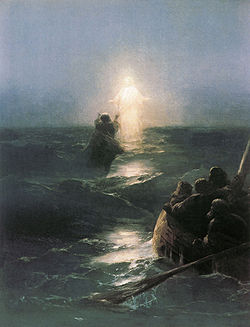 It is highly significant that Elijah did not find God in the wind, the earthquake, or the fire, but only in a “sound of sheer silence.” (1 Kg 19:12) It happens that Elijah had just run away from fire and storm when he heard this sound of silence. Since Elijah had just “won” the battle with the priests of Baal, one might have thought that God had spoken through wind and fire that time, but the result of “winning” that contest was needing to run for his life because Jezebel was out to get him. So it seems God had not spoken in the wind and fire on Mount Carmel after all. If we stop the story with the “sound of sheer silence,” we are edified, but when we read on to the words Elijah heard, we are seriously troubled. At least I am. Elijah is told to anoint Elisha to be his successor prophet. So far so good. But Elijah is also told to anoint Jehu son of Nimshi to be king of Israel. The narrative of Jehu’s cold-blooded coup d’état is chilling to say the least. (2 Kg. 9) More chilling are the words Elijah heard: “Whoever escapes from the sword of Hazael, Jehu shall kill; and whoever escapes from the sword of Jehu, Elisha shall kill.” (1 Kg. 19: 17) After the violent rivalry between Elijah and the priests of Baal, we get the crossfire of the violent rivalry between Hazael and the House of Ahab: more storm and fire. I have a hard time hearing this storm in the “sound of sheer silence.”
It is highly significant that Elijah did not find God in the wind, the earthquake, or the fire, but only in a “sound of sheer silence.” (1 Kg 19:12) It happens that Elijah had just run away from fire and storm when he heard this sound of silence. Since Elijah had just “won” the battle with the priests of Baal, one might have thought that God had spoken through wind and fire that time, but the result of “winning” that contest was needing to run for his life because Jezebel was out to get him. So it seems God had not spoken in the wind and fire on Mount Carmel after all. If we stop the story with the “sound of sheer silence,” we are edified, but when we read on to the words Elijah heard, we are seriously troubled. At least I am. Elijah is told to anoint Elisha to be his successor prophet. So far so good. But Elijah is also told to anoint Jehu son of Nimshi to be king of Israel. The narrative of Jehu’s cold-blooded coup d’état is chilling to say the least. (2 Kg. 9) More chilling are the words Elijah heard: “Whoever escapes from the sword of Hazael, Jehu shall kill; and whoever escapes from the sword of Jehu, Elisha shall kill.” (1 Kg. 19: 17) After the violent rivalry between Elijah and the priests of Baal, we get the crossfire of the violent rivalry between Hazael and the House of Ahab: more storm and fire. I have a hard time hearing this storm in the “sound of sheer silence.”
We have more storms in the story of Jesus’ disciples taking a boat across the lake. As almost always with Jesus, there were some human storms. Jesus had just learned of the ignominious death of John the Baptist as a result of a sophisticated mob violence at court. Afterwards, Jesus fed a mob of people who were hungry both for food and God’s Word. Matthew doesn’t mention this mob’s attempt to take Jesus by force to make him king but one can’t help but think that Jesus went off alone to pray because he needed to center himself again on his heavenly Abba after what had just happened. I’m inclined to see in the storm at sea not only a natural phenomena but an interpersonal phenomena as well. I wrote in my book Moving and Resting in God’s Desire: “The story of Peter walking on water — or trying to — also illustrates this aiming [to be centered on God]. (Mt. 14:28-33) The wind and the choppy waves represent our being overwhelmed by the mimetic movements that tend toward rage and persecution. When Peter looked at the waves instead of at Jesus, he started to sink. By himself, he would have sunk and drowned. By looking again at Jesus, Peter was pulled into the boat and the sea grew calm.”
[Tom and Laura Truby develop these thoughts with excellence in their sermon The Raging Storm of Our Own Making.”]
Both of these scripture readings make it dramatically clear that being truly focused on God and God’s peace beyond human understanding is very difficult. Elijah shows how it is very possible to hear the “sheer silence” and yet also “hear” the violence unfolding in his generation. That Elijah was persecuted by Jezebel, Ahab’s wife, makes it understandable that Elijah would hear, even in the “sheer silence,” his own anger and fear towards Ahab’s royal house. Likewise, the disciples in the boat on the stormy sea are so caught up both in the natural storm and the storm of their own disputatiousness that even Jesus himself appears as an object of horror rather than peace. We should take this as a warning of how our prayer in trying times can be distorted by our own anger and anxiety.
There is no simple solution I can offer for this difficulty we all face. In principle, it seems simple to say that we should turn to Jesus and stay turned to him. The problem is that this “simple” solution is difficult minute by minute, second by second. We look at the chaotic waves of the water and sink back into our fears, resentment, and rage. It is a huge help if we remain aware of this weakness and don’t mistake the storms inside ourselves for the word of God. When we fall into our rage, the storm continues, for Jesus calms the waters; he does not stir them up. It takes time and discipline to keep even enough focus on the “sheer silence” to help us see the rage we keep hearing for what it is. Imitating Peter by crying for mercy is essential as this is a cry of repentance of our violence that is the first step to living in the peace of Christ.
